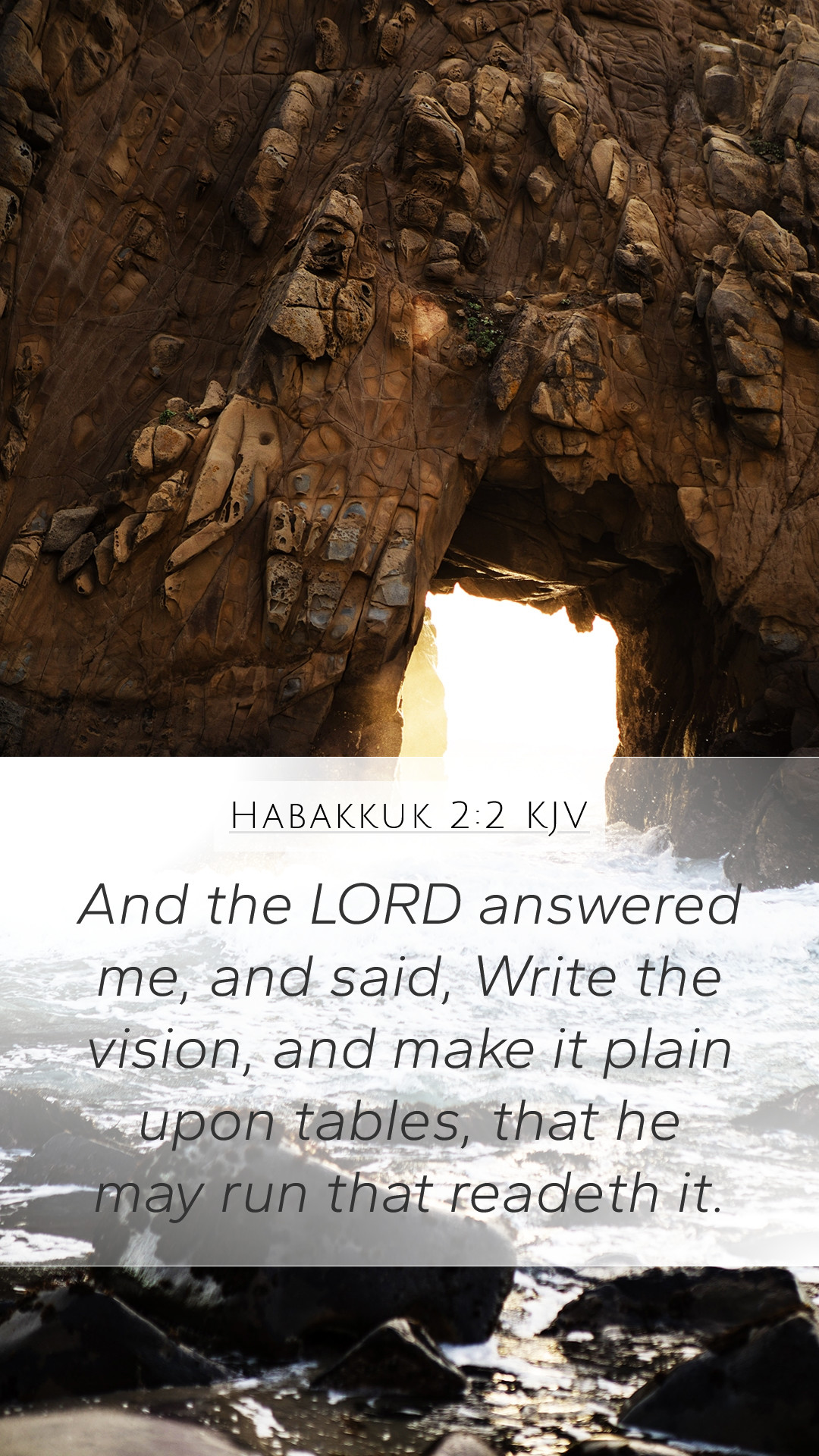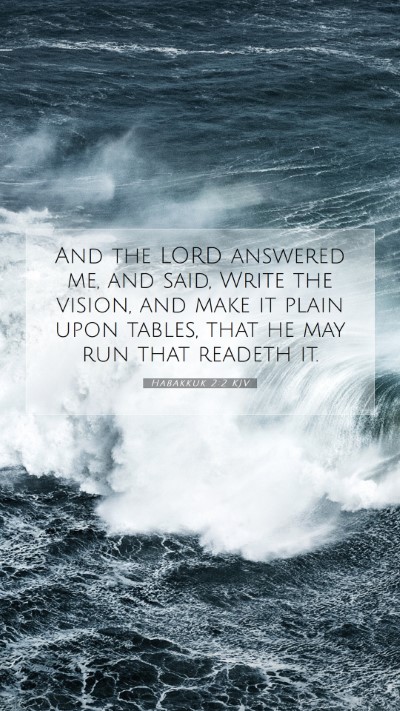Old Testament
Genesis Exodus Leviticus Numbers Deuteronomy Joshua Judges Ruth 1 Samuel 2 Samuel 1 Kings 2 Kings 1 Chronicles 2 Chronicles Ezra Nehemiah Esther Job Psalms Proverbs Ecclesiastes Song of Solomon Isaiah Jeremiah Lamentations Ezekiel Daniel Hosea Joel Amos Obadiah Jonah Micah Nahum Habakkuk Zephaniah Haggai Zechariah MalachiHabakkuk 2:2 Meaning
What is the meaning of Habakkuk 2:2?
And the LORD answered me, and said, Write the vision, and make it plain upon tables, that he may run that readeth it.
Habakkuk 2:2 Bible Verse Meaning
Understanding Habakkuk 2:2 - A Comprehensive Bible Verse Commentary
Habakkuk 2:2 states, "And the Lord answered me, and said, Write the vision, and make it plain upon tables, that he may run that readeth it." This verse serves as a pivotal call for clarity in the communication of God's message. To grasp the full significance of this scripture, we will explore interpretations and insights from well-respected public domain commentators.
Overview of Habakkuk 2:2
This verse encapsulates a moment in which the prophet Habakkuk receives divine instruction from God. It highlights the importance of recording God's revelations in a clear and accessible manner. The essence of this command emphasizes the need for the faithful to be able to comprehend and act on divine instructions.
Commentary Insights
-
Matthew Henry's Commentary
According to Matthew Henry, the instruction to "write the vision" emphasizes the significance of capturing God's directives in written form. This ensures that the message remains unchanged and is readily available for future reference. Henry suggests that God's word should not only be preserved but also made accessible to all, encouraging individuals to act upon it.
-
Albert Barnes' Notes
Albert Barnes expounds on the idea of the vision being "made plain." He suggests this clarity is crucial for those who read it. The phrase "that he may run that readeth it" indicates that the message is urgent, requiring prompt action. Barnes interprets this as an invitation for believers to actively participate in God's plan without delay.
-
Adam Clarke's Commentary
Adam Clarke offers a deeper historical and practical perspective, indicating that writing the vision on tablets served as a public declaration. This practice not only preserved God's word but also served as a source of encouragement for those who face oppression. Clarke notes the dual purpose of documentation—not only for understanding but also for mobilizing the faithful.
Key Themes and Applications
The themes emerging from Habakkuk 2:2 include:
- Clarity in Revelation: It is essential to understand that God communicates not only through visions but also expects us to document and share these revelations.
- Urgency of God's Message: The urgency in "running" signifies that those who understand God's revelations are called to act swiftly in response to His guidance.
- The Prophetic Call: This verse serves as a reminder for all believers to be attentive to God's word and to ensure its dissemination.
Cross References
This verse can be related to several other scriptures that emphasize similar themes:
- Jeremiah 30:2: "Thus saith the Lord God of Israel, saying, Write thee all the words that I have spoken unto thee in a book."
- Revelation 1:11: "Saying, I am Alpha and Omega, the first and the last: and, What thou seest, write in a book, and send it unto the seven churches."
- Romans 10:15: "And how shall they preach, except they be sent? as it is written, How beautiful are the feet of them that preach the gospel of peace, and bring glad tidings of good things!"
Conclusion
In conclusion, Habakkuk 2:2 serves as a profound exhortation for believers to recognize the importance of recording and sharing God's messages. The commentaries provided by Henry, Barnes, and Clarke enrich our understanding and appreciation of the text. By engaging with the scripture in this manner, individuals can gain valuable Bible study insights, enhancing both personal and communal Bible study experiences. Grasping such Bible verse meanings fosters a deeper connection to the Word and empowers believers to apply these insights in their daily lives.


